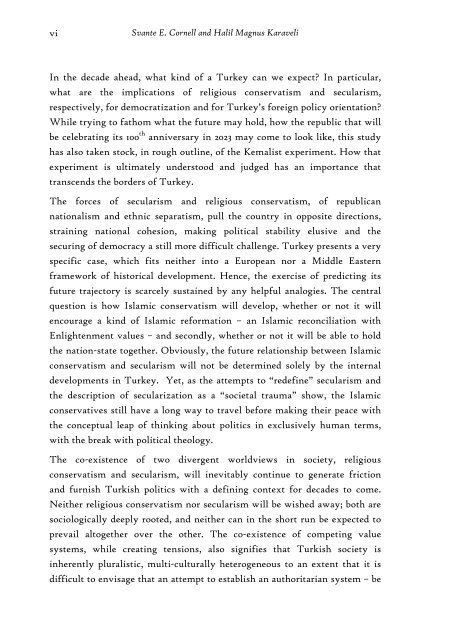2008_10_SRP_CornellKaraveli_Turkey
2008_10_SRP_CornellKaraveli_Turkey
2008_10_SRP_CornellKaraveli_Turkey
You also want an ePaper? Increase the reach of your titles
YUMPU automatically turns print PDFs into web optimized ePapers that Google loves.
vi<br />
Svante E. Cornell and Halil Magnus Karaveli<br />
In the decade ahead, what kind of a <strong>Turkey</strong> can we expect? In particular,<br />
what are the implications of religious conservatism and secularism,<br />
respectively, for democratization and for <strong>Turkey</strong>’s foreign policy orientation?<br />
While trying to fathom what the future may hold, how the republic that will<br />
be celebrating its <strong>10</strong>0 th anniversary in 2023 may come to look like, this study<br />
has also taken stock, in rough outline, of the Kemalist experiment. How that<br />
experiment is ultimately understood and judged has an importance that<br />
transcends the borders of <strong>Turkey</strong>.<br />
The forces of secularism and religious conservatism, of republican<br />
nationalism and ethnic separatism, pull the country in opposite directions,<br />
straining national cohesion, making political stability elusive and the<br />
securing of democracy a still more difficult challenge. <strong>Turkey</strong> presents a very<br />
specific case, which fits neither into a European nor a Middle Eastern<br />
framework of historical development. Hence, the exercise of predicting its<br />
future trajectory is scarcely sustained by any helpful analogies. The central<br />
question is how Islamic conservatism will develop, whether or not it will<br />
encourage a kind of Islamic reformation – an Islamic reconciliation with<br />
Enlightenment values – and secondly, whether or not it will be able to hold<br />
the nation-state together. Obviously, the future relationship between Islamic<br />
conservatism and secularism will not be determined solely by the internal<br />
developments in <strong>Turkey</strong>. Yet, as the attempts to “redefine” secularism and<br />
the description of secularization as a “societal trauma” show, the Islamic<br />
conservatives still have a long way to travel before making their peace with<br />
the conceptual leap of thinking about politics in exclusively human terms,<br />
with the break with political theology.<br />
The co-existence of two divergent worldviews in society, religious<br />
conservatism and secularism, will inevitably continue to generate friction<br />
and furnish Turkish politics with a defining context for decades to come.<br />
Neither religious conservatism nor secularism will be wished away; both are<br />
sociologically deeply rooted, and neither can in the short run be expected to<br />
prevail altogether over the other. The co-existence of competing value<br />
systems, while creating tensions, also signifies that Turkish society is<br />
inherently pluralistic, multi-culturally heterogeneous to an extent that it is<br />
difficult to envisage that an attempt to establish an authoritarian system – be


